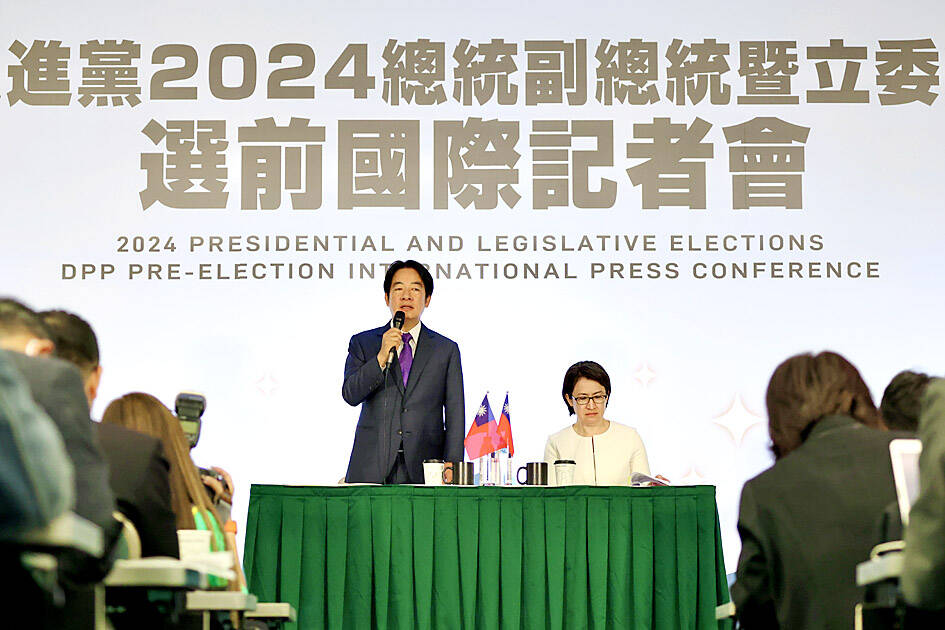Vice President William Lai (賴清德), the Democratic Progressive Party’s (DPP) presidential candidate, yesterday said that he would maintain the “status quo” and pursue peace through strength if elected, remaining open to engagement with Beijing under the preconditions of equality and dignity.
Lai pledged to try to engage with China, as dialogue could decrease cross-straits risks, and said peaceful development is in the best interests of both sides and the rest of the world.
“Peace is priceless and war has no winners,” Lai said at a news conference in which he appeared alongside DPP vice presidential candidate Hsiao Bi-khim (蕭美琴).

Photo: Ritchie B. Tongo, EPA-EFE
However, “accepting China’s one principle proposition is not true peace,” Lai said. “Peace without sovereignty is just like Hong Kong. It is fake peace.”
The DPP and the Chinese Nationalist Party (KMT), which traditionally favors closer ties with China, have committed to bolstering Taiwan’s defenses.
Both say only Taiwan’s 23 million people can decide their future, although the KMT says it strongly opposes independence.
“There is an expectation among the international community that [we] maintain the ‘status quo,’” Lai said, adding that this “is [the responsibility] that both sides of the Taiwan Strait need to bear together.”
“We have no plan” to declare Taiwanese independence, because “the Republic of China, Taiwan, is already an independent sovereign nation,” Lai said.
Lai said that he would continue the policy direction of President Tsai Ing-wen (蔡英文), including efforts to maintain the “status quo” in the Taiwan Strait and expand links with democratic nations.
Lai said that a DPP victory would pave the way for Beijing to “reassess its policy toward Taiwan,” as it would showcase Taiwanese voters’ support for the nation’s current direction and render Chinese interference operations in favor of his opponents futile.
“My being elected would be helpful for creating a new situation in the Indo-Pacific region” that would contribute to the stability of the Taiwan Strait, Lai said.
Lai also said if elected, Taiwan would continue to build up its defense deterrence amid geopolitical tensions. Since the previous election in 2020, China’s People’s Liberation Army has markedly stepped up military exercises around Taiwan.
“The pursuit of peace relies on strength, not the goodwill of the aggressor,” Lai said, vowing to bolster both the military and the economy.
Former representative to the US Hsiao said that facing the restructuring of the global economy, Taiwan — home to the world’s largest contract chipmaker, Taiwan Semiconductor Manufacturing Co (台積電) — must maintain its competitiveness and key position in supply chains.
“In order for Taiwan’s economic strength to grow, it is necessary to integrate with the world,” Hsiao said.
Lai said the election would serve as a “testament to our commitment to democracy,” while also adding that China’s interference in the presidential and legislative elections has been the “most serious” yet.
Additional reporting by CNA

TRUST: The KMT said it respected the US’ timing and considerations, and hoped it would continue to honor its commitments to helping Taiwan bolster its defenses and deterrence US President Donald Trump is delaying a multibillion-dollar arms sale to Taiwan to ensure his visit to Beijing is successful, a New York Times report said. The weapons sales package has stalled in the US Department of State, the report said, citing US officials it did not identify. The White House has told agencies not to push forward ahead of Trump’s meeting with Chinese President Xi Jinping (習近平), it said. The two last month held a phone call to discuss trade and geopolitical flashpoints ahead of the summit. Xi raised the Taiwan issue and urged the US to handle arms sales to

A magnitude 5.6 earthquake struck off the coast of Yilan County at 12:37pm today, with clear shaking felt across much of northern Taiwan. There were no immediate reports of damage. The epicenter of the quake was 16.9km east-southeast of Yilan County Hall offshore at a depth of 66.8km, Central Weather Administration (CWA) data showed. The maximum intensity registered at a 4 in Yilan County’s Nanao Township (南澳) on Taiwan’s seven-tier scale. Other parts of Yilan, as well as certain areas of Hualien County, Taipei, New Taipei City, Taoyuan, Hsinchu County, Taichung and Miaoli County, recorded intensities of 3. Residents of Yilan County and Taipei received

Taiwan has secured another breakthrough in fruit exports, with jujubes, dragon fruit and lychees approved for shipment to the EU, the Ministry of Agriculture said yesterday. The Animal and Plant Health Inspection Agency on Thursday received formal notification of the approval from the EU, the ministry said, adding that the decision was expected to expand Taiwanese fruit producers’ access to high-end European markets. Taiwan exported 126 tonnes of lychees last year, valued at US$1.48 million, with Japan accounting for 102 tonnes. Other export destinations included New Zealand, Hong Kong, the US and Australia, ministry data showed. Jujube exports totaled 103 tonnes, valued at

BIG SPENDERS: Foreign investors bought the most Taiwan equities since 2005, signaling confidence that an AI boom would continue to benefit chipmakers Taiwan Semiconductor Manufacturing Co’s (TSMC, 台積電) market capitalization swelled to US$2 trillion for the first time following a 4.25 percent rally in its American depositary receipts (ADR) overnight, putting the world’s biggest contract chipmaker sixth on the list of the world’s biggest companies by market capitalization, just behind Amazon.com Inc. The site CompaniesMarketcap.com ranked TSMC ahead of Saudi Aramco and Meta Platforms Inc. The Taiwanese company’s ADRs on Tuesday surged to US$385.75 on the New York Stock Exchange, as strong demand for artificial intelligence (AI) applications led to chip supply constraints and boost revenue growth to record-breaking levels. Each TSMC ADR represents